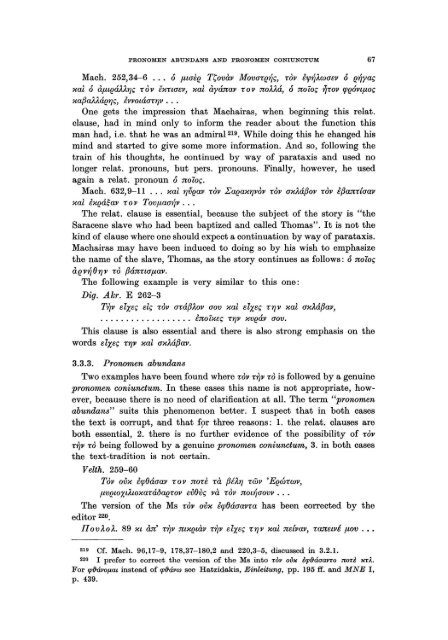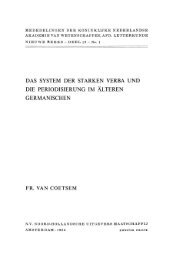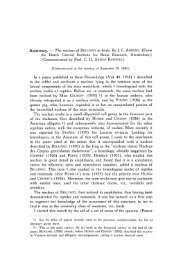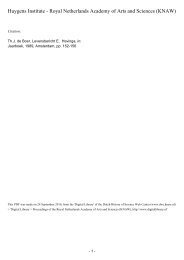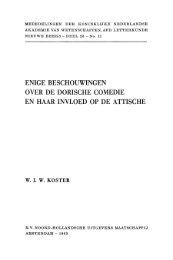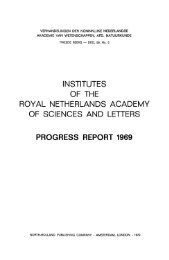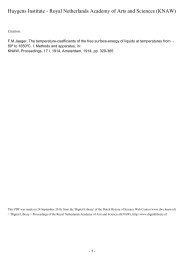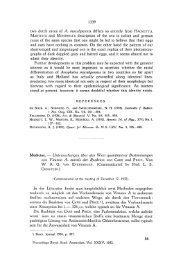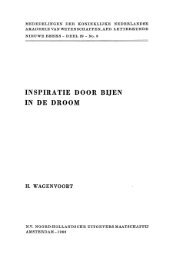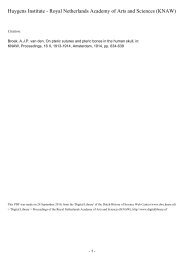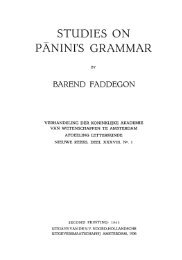Pronomen Abundans and Pronomen Coniunctum. A ... - DWC
Pronomen Abundans and Pronomen Coniunctum. A ... - DWC
Pronomen Abundans and Pronomen Coniunctum. A ... - DWC
Create successful ePaper yourself
Turn your PDF publications into a flip-book with our unique Google optimized e-Paper software.
PRONOMEN ABUNDANS AND PRONOMEN CONIUNCTUM 67<br />
Mach. 252,34-6 ... ó {twè(! Ti;ovàv Movar(!~ç, TClv è1p~ÀWaéV ó (!~yaç<br />
"ai ó à{tt(!áJ..À'fJç rov g"naév, "ai àyánav rov nOÀÀá, ó noioç ~rov rp(!ÓVt{toç<br />
"a{JaÀM(!'fJç, èvvotáar'fJv ...<br />
One gets the impression that Machairas, when beginning this relat.<br />
clause, had in mind only to inform the reader about the function this<br />
man had, i.e. that he was an admiral 219 • While doing this he changed his<br />
mind <strong>and</strong> started to give some more information. And so, following the<br />
train of his thoughts, he continued by way of parataxis <strong>and</strong> used no<br />
longer relat. pronouns, but pers. pronouns. Finally, however, he used<br />
again arelat. pronoun ó noloç.<br />
Mach. 632,9-11 ... "al 'fJv(!av rov I:a(!a,,'fJvov rov a"M{Jov rov è{Janrtaav<br />
"al è,,(!á;av rov Tov{taa~v ...<br />
The relat. clause is essential, because the subject of the story is "the<br />
Saracene slave who had been baptized <strong>and</strong> called Thomas". It is not the<br />
kind of clause where one should expect a continuation by way of parataxis.<br />
Machairas may have been induced to doing so by his wish to emphasize<br />
the name of the slave, Thomas, as the story continu es as follows: ó noloç<br />
à(!v~O'fJ1I ro {Jánna{ta1l.<br />
The following example is very similar to this one:<br />
Dig. Akr. E 262-3<br />
Tijv ÛXéÇ ûç rov ará{JÀov aov "al ÛXéÇ r'fJv "al a"M{Jav,<br />
......... . ........ ènoi"éç r'fJv "v(!áv aov.<br />
This clause is also essential <strong>and</strong> there is also strong emphasis on the<br />
words ÛXéÇ r'fJ1I "al a"M{Ja1l.<br />
3.3.3. <strong>Pronomen</strong> Mundans<br />
Two examples have been found where r01l rij1l ro is followed by a genuine<br />
pronomen coniunctum. In these cases this name is not appropriate, however,<br />
because there is no need of clarification at all. The term "pronomen<br />
abundans" suits this phenomenon better. I suspect that in both cases<br />
the text is corrupt, <strong>and</strong> that f?r three reasons : 1. the relat. clauses are<br />
both essential, 2. there is no further evidence of the possibility of rov<br />
rij1l ro being followed by a genuine pronomen coniunctum, 3. in both cases<br />
the text-tradition is not certain.<br />
Velth. 259-60<br />
Tov 0'13" èrpOáaav rov noTè rà {JéÀ'fJ nvv' E(!wrwv,<br />
IW(!WXtÀw"ará15a(!rov éVOVÇ và rov not~aovv ...<br />
The version of the Ms r01l 0'13" ècpOáaa1lra has been corrected by the<br />
editor 220.<br />
II ovÀoÀ. 89 "t àn' rijv m"(!tàv rijv ÛXéÇ r'fJv "ai nétvav, ranétvÉ {t~v .••<br />
219 Cf. Mach. 96,17-9, 178,37-180,2 <strong>and</strong> 220,3-5, discussed in 3.2.1.<br />
220 I prefer to correct the vers ion of the Ms into TOV ot!" lrpf)áaav-ro nOTf; ",J..<br />
For rpf)ávOflat instead of rpf)ávw see Hatzidakis, Einleitung, pp. 195 ff. <strong>and</strong> MNE I,<br />
p. 439.


